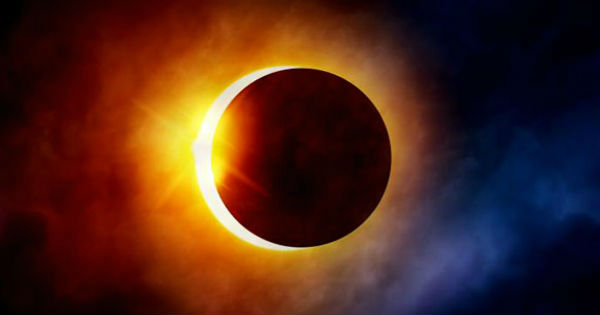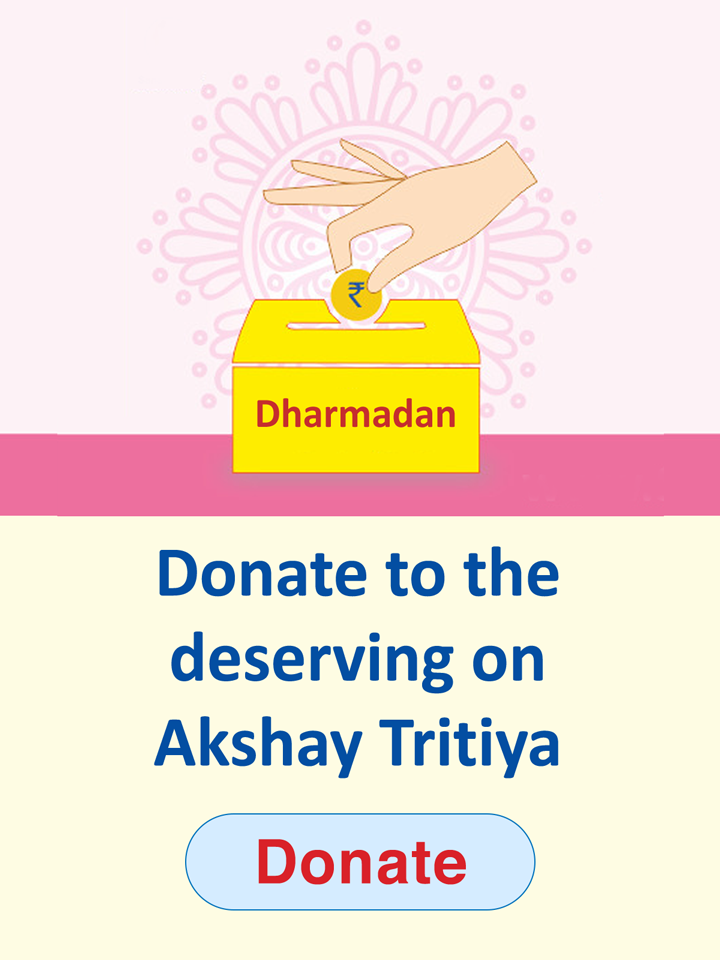Information on the last solar eclipse of 2019, falling on Thursday, Margashirsha Amavasya (26.12.2019)

1. The Solar eclipse
‘On Thursday 26.12.2019, Margashirsha Amavasya, in South India the annular solar eclipse will be visible since 9.30 a.m. In the rest of Bharat this eclipse will be a partial solar eclipse.
When the moon appears between the sun and earth and its shadow falls on the earth it is called an eclipse. Wherever it falls, for some time, due to the shadow of the moon the sun appears to be covered. When the sun is covered totally it is called a total solar eclipse otherwise it is a partial solar eclipse. When the sun is visible like a ring, it is called an annular solar eclipse. This is seen only on new moon days. Maharshi Artrimuni was the first one to teach about this eclipse.’
2. Timeline of the solar eclipse, visible all over Bharat
‘This eclipse will be visible on the entire continent of Asia, in Ethiopia and Kenya on the continent of Africa and in the north of Australia. In Kerala, Tamilnadu, etc the eclipse will be annular and will extend from 8.04 a.m. to 10.55 a.m.’ (Reference : Date Panchang)
2 A. Timeline of the solar eclipse (for Mumbai)
2 A 1. Onset : 26.12.2019, 8.04 a.m.
2 A 2. Middle of the eclipse : 26.12.2019, 9.22 a.m.
2 A 3. Culmination : 26.12.2019, 10.55 a.m.
2 B. Beneficial period (Note 1) (total duration from the onset till the culmination)
2.51 hours
Note 1 : The period from the onset to the culmination of the eclipse is the period when benefit is derived. As per Scriptures if during this period you remain in communion with God then you derive maximum spiritual benefit.

2 C. Onset of the eclipse
2 C 1. Meaning
Before the solar eclipse the sun starts coming in the shadow of the moon with gradual reduction in its radiance. This phenomenon is called onset of the eclipse.
2 C 2. Duration
‘Since this solar eclipse is in the first prahar (Note 2) of the day restrictions should be observed from the sunset of 25.12.2019 till culmination of the eclipse on 26.12.2019 at 10.55 a.m.’ (Reference : Date Panchang)
Note 2 : One prahar is equivalent to 3 hours. A day consists of 8 prahars, 4 in the day and 4 at night.
3. Restrictions to be observed during the solar eclipse
‘At the onset of the eclipse you may bathe, perform ritualistic worship (puja), chanting and shraddha (rite for the deceased). Also urination, defecation and sleep are allowed but eating is prohibited. However these acts are prohibited during the actual eclipse from 8 to 11 a.m. Children, the sick, the old and infirm, as well as pregnant women should observe the restrictions of the eclipse from midnight on 25.12.2019 till its culmination.’ (Reference : Date Panchang)
3 A. Importance of following restrictions from the viewpoint of health
3 A 1. Physical and spiritual levels
As before the eclipse micro-organisms multiply fast, food gets spoilt. During this period immunity to disease is also lowered. Just as food cooked the previous day becomes stale the next day, so also food cooked before an eclipse gets contaminated after an eclipse and has to be discarded. However this rule does not apply to milk and water, so both can be used after the eclipse.
3 A 2. Psychological level
The period before the eclipse also affects the mental state. According to psychiatrists some individuals develop psychological problems such as depression, anxiety etc. during this period.
The benefit derived from spiritual practice performed during an eclipse is thousands of times greater than otherwise. That is precisely why it is important to give priority to spiritual practice during this period. So keep the mind occupied in religious activities such as chanting, recitation of Holy verses, meditation, etc. from the onset of the eclipse till its culmination.
4. Acts prohibited during an eclipse
‘4 A. Restrictions during an eclipse
Sleep, urination and defecation, oil body massage, eating and sexual intercourse are prohibited from the onset of the eclipse till its culmination.
4 B. Which acts should be performed ?
1. Bathing at the onset of the eclipse
2. During the eclipse ritualistic worship (puja), tarpan (offering water to deceased ancestors), shraddha, chanting, hom and donation can be done.
3. If mantras stopped for some reason are restarted during the eclipse period then the benefit is multiplied manifold.
4. Bathing after culmination of the eclipse.
If an individual is observing seclusion (ashaucha) then he can do purification if he wishes to bath and make an offering during the eclipse period.
5. Benefits of the eclipse to the individual as per horoscope (rashi)
5 A. Positive effects : Karka (Cancer), Tula (Libra), Kumbha (Aquarius) and Meen (Pisces)
5 B. Negative effects : Vrushabh (Taurus), Kanya (Virgo) , Dhanu (Saggitarius) and Makar (Capricorn)
5 C. Mixed effects : Mesh (Aries), Mithun (Gemini), Simha (Leo) and Vrushchik (Scorpio).
Those sun signs for whom the effects are negative and pregnant women, should not watch the solar eclipse.’
(Reference : Date Panchang)
6. Precautions to be taken when watching the solar eclipse
‘An annular eclipse will be visible for only 3 minutes during which protective glasses have to be worn. An annular eclipse will be visible in North Bharat once again on 21.6.2020. After 1890 it was last visible on January 15, 2010 in some parts of South Bharat.’ (Reference : Date Panchang)
7. Information on bathing during an eclipse
‘During an eclipse any water becomes equivalent to the water of the sacred River Ganga. Hot water gives more merit than cold water. Merit increases progressively by bathing with water drawn from a water body, flowing water, water from a lake, river, large river, the Ganga and sea. Special importance is accorded to bathing in River Narmada during a solar eclipse. If bathing in the Narmada is not possible then imagine that you are bathing in its waters.’ (Reference : Date Panchang)
8. Importance of spiritual practice in a solar eclipse
The special environment during an eclipse period has an effect on all living organisms. For spiritual practice, a solar eclipse is more beneficial than a lunar eclipse. An eclipse is considered important in astrology, religion and the modern sciences. As it is a transitory period the effects of spiritual practice performed during this period are visible at once. The benefit of chanting and donation done during this period increase infinitely. Hence after an eclipse one should donate as per capacity. A solar eclipse is the best time to receive a new mantra and to chant it. If a mantra which has been stopped is restarted then it becomes effective. During a solar eclipse chanting performed with immense faith and concentration by remembering the Guru in different ways, overcomes physical, psychological, spiritual and worldly distress. Success is met with in all tasks. No mala (beaded necklace used for chanting) is required for chanting during this period. The entire period of an eclipse from the onset, to culmination is extremely important.’

 Sanatan Sanstha to participate in Global Spirituality Mahotsav organised in Hyderabad from 14th to 17th...
Sanatan Sanstha to participate in Global Spirituality Mahotsav organised in Hyderabad from 14th to 17th... Saints of Sanatan Sanstha attended the inauguration ceremony of B.A.P.S. Temple in Abu Dhabi!
Saints of Sanatan Sanstha attended the inauguration ceremony of B.A.P.S. Temple in Abu Dhabi! Vedshastra Research and Foundation honored Sanatan Sanstha with the award ‘Pillars of Hindutva’
Vedshastra Research and Foundation honored Sanatan Sanstha with the award ‘Pillars of Hindutva’ Sachchidananda Parabrahman (Dr) Athavale’s resolve is there that Dharmaprasar takes place to the maximum through...
Sachchidananda Parabrahman (Dr) Athavale’s resolve is there that Dharmaprasar takes place to the maximum through...